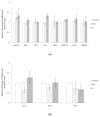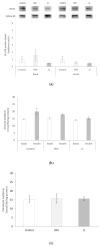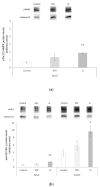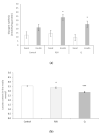Effects of Physiological Doses of Resveratrol and Quercetin on Glucose Metabolism in Primary Myotubes
- PMID: 33573178
- PMCID: PMC7866515
- DOI: 10.3390/ijms22031384
Effects of Physiological Doses of Resveratrol and Quercetin on Glucose Metabolism in Primary Myotubes
Abstract
Phenolic compounds have emerged in recent years as an option to face insulin resistance and diabetes. The central aim of this study was: (1) to demonstrate that physiological doses of resveratrol (RSV) or quercetin (Q) can influence glucose metabolism in human myotubes, (2) to establish whether AMP-activated protein kinase (AMPK) and protein kinase B -PKB- (Akt) pathways are involved in this effect. In addition, the effects of these polyphenols on mitochondrial biogenesis and fatty acid oxidation were analysed. Myotubes from healthy donors were cultured for 24 h with either 0.1 μM of RSV or with 10 μM of Q. Glucose metabolism, such as glycogen synthesis, glucose oxidation, and lactate production, were measured with D[U-14C]glucose. β-oxidation using [1-14C]palmitate as well as the expression of key metabolic genes and proteins by Real Time PCR and Western blot were also assessed. Although RSV and Q increased pgc1α expression, they did not significantly change either glucose oxidation or β-oxidation. Q increased AMPK, insulin receptor substrate 1 (IRS-1), and AS160 phosphorylation in basal conditions and glycogen synthase kinase 3 (GSK3β) in insulin-stimulated conditions. RSV tended to increase the phosphorylation rates of AMPK and GSK3β. Both of the polyphenols increased insulin-stimulated glycogen synthesis and reduced lactate production in human myotubes. Thus, physiological doses of RSV or Q may exhibit anti-diabetic actions in human myotubes.
Keywords: glucose; human primary myotubes; quercetin; resveratrol.
Conflict of interest statement
The authors declare no conflict of interest.
Figures





References
-
- Diabetes. World Health Organization: 2018; Volume 2019. [(accessed on 12 May 2020)]; Available online: https://www.who.int/health-topics/diabetes#tab=tab_1.
-
- Villarroel-Espíndola F., Maldonado R., Mancilla H., Stelt K.V., Acuña A.I., Covarrubias A., López C., Angulo C., Castro M.A., Slebe J.C., et al. Muscle glycogen synthase isoform is responsible for testicular glycogen synthesis: Glycogen overproduction induces apoptosis in male germ cells. J. Cell. Biochem. 2013;114:1653–1664. doi: 10.1002/jcb.24507. - DOI - PubMed
MeSH terms
Substances
Grants and funding
LinkOut - more resources
Full Text Sources
Other Literature Sources
Medical
Miscellaneous

